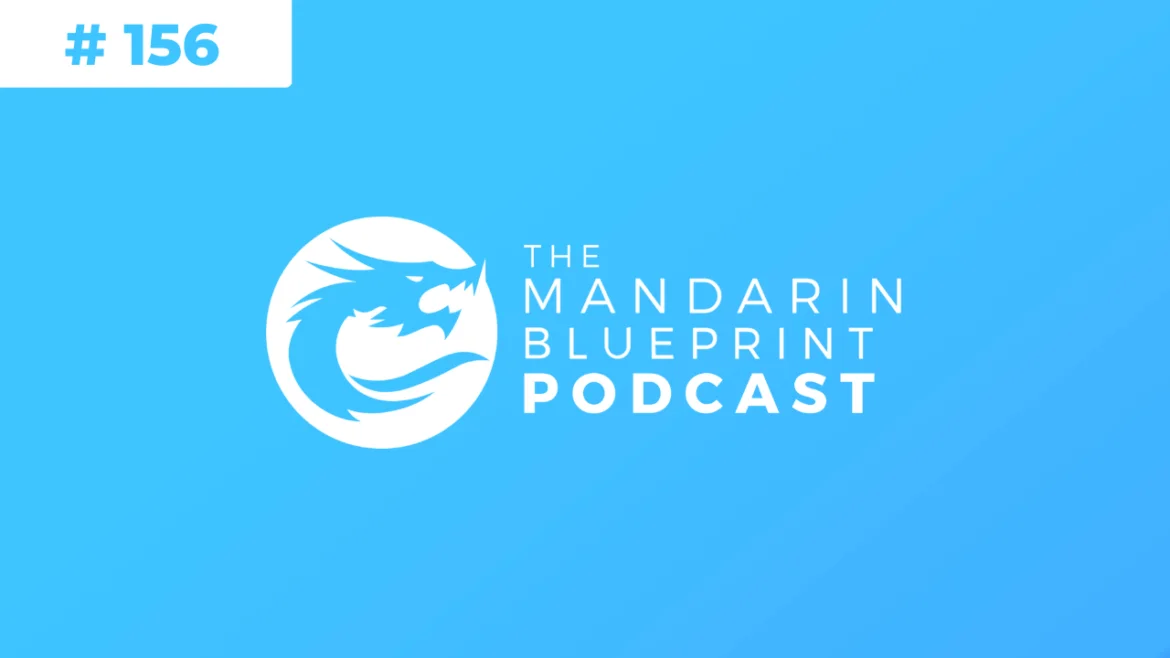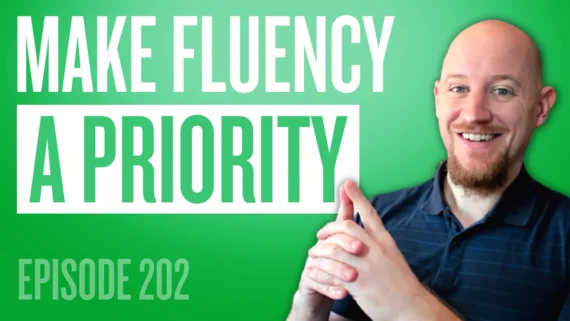
156. Advanced Comparisons, Rote Learning, Shadowing, and More
欢迎光临! Welcome!
You can now subscribe to the podcast by the links below, or you can subscribe by copying the following URL into your favorite podcast APP.
The Mandarin Blueprint Podcast focuses primarily on The Blueprint online curriculum. Creators Luke Neale & Phil Crimmins answer questions and comments, discuss topics related to China and Mandarin learning, and have special guests.
Want to learn how to speak fluent Chinese fast? Join our free Webinar right here.
欢迎光临! Welcome!
You can now subscribe to the podcast on iTunes, Stitcher, Spotify, or you can subscribe by copying the following URL into your favorite podcast APP:
https://www.mandarinblueprint.com/feed/podcast/
The Mandarin Blueprint Podcast focuses primarily on The Mandarin Blueprint Method online curriculum. Creators Luke Neale & Phil Crimmins answer questions and comments, discuss topics related to China and Mandarin learning, and have special guests.
0:00 Reviews
Leave us a Google Business Review 🙂
10:19 Comments & Emails
Richard Ashbrooke by Email
Phil and Luke,
Amazing, amazing, amazing! Twice I have responded and twice I have featured in a podcast / YouTube clip.
What I say is true. Rote leaning is a fools game. As an avid movie / tv watcher, your course, is, well, easy. Saying that, if you aren’t a movie / tv person, for those into music, the same rule applies (utilise lyrics / film clips to your advantage!)! If you aren’t into any of those suggestions, there are real life experiences to draw upon. Essentially, there is no excuse for people to not learn Chinese with, Mandarin Blueprint.
Find your medium (film / tv, music, real life) and get learning (Anki via Mandarin Blueprint is King / Queen!). #lifelong member = #lifelong learner!
When the boarders open up from 澳大利亚 to 中国, we my friends, are going for some serious Yum Cha time!
Regards,
Richard
13:11
Oscar Haglund by Email
Hi
My name is Oscar Haglund and I tried to start learning Chinese 6-7 years ago when I signed up for an evening course at the university. I learned a bit, but in the end forgot most of it. 1 year ago I made a new attempt starting with Duolingo which I hated, and then with Mandarin Blueprint which I love.
10 months later I can now read and write approximately 1100 characters and many more words and I can read native books aimed for small children (i.e. not graded readers specifically targeted to my level). All of this is accomplished by studying a few hours every day.
At the core of the Mandarin Blueprint is the Hanzi movie method, a mnemonic method for remembering characters and their pronunciation. This is surrounded by a highly structured framework that provides a character learning order based on making learning easy instead of giving you the most bang for buck characters first, as well as plenty of graded reading content.
If you feel hesitant reading about how the method works and you wonder if it will really work for you, then I can tell you that since it works for me it will probably work for you. Using this method compared to traditional learning techniques is night and day. Considering the free trial, you are really making a huge mistake if you are trying to learn Chinese without looking into this course.
With that out of the way I have some additional feedback that may or may not be interesting for you.
1.
Sentence overload: Just like Rebecca and Christine talked about in their joint interview I have also experienced that reading sentences in Anki is getting to be too much. I have been unsuspending every note in Anki and I was on pace to finish Intermediate by the end of the year (albeit with a crushing 2-2.5 hour daily review burden) when you dropped the course update with 1500+ new sentences. I guess this was the straw that broke the camel’s back.
I went back and forth a lot and finally settled on unsuspending at least one sentence per character and then rarely unsuspending additional ones if I saw some that were of particular interest. This way I would still get the reading practise for many words as they would appear in sentences along the way.
I also changed the way I use the sentence cards. I have converted them all away from cloze deletes into just showing me the sentence. I did this because I found that if I was to learn the card to the point that I could guess the cloze delete it would take an enormous amount of time that I just did not have. Instead I decided that I would learn words passively in the same way I learned English (by just reading and only rarely looking words up).
2.
Anki settings: I think that the default Anki settings are bad and that you are doing your students a disservice to not tell them to change it into something better. The most egregious one is that the “new interval” setting under “lapses” defaults to 0. This means that forgetting a small detail of a character will reset you to 0 as if you never knew the character at all. My suspicion is that this behaviour will cause people to cheat and press “good” when they actually failed by for example missing a single stroke. A more reasonable setting would be 50 as it allows you to forget minor details without being massively punished.
Another issue with anki is that its ease value does not rebound by itself. This is harder to solve and it basically requires using an addon. I know you intend to ditch Anki so at the very least I would say that these things absolutely MUST be something that can be managed by the new software.
For me these will be deal-breakers for the upper-intermediate and advanced courses. I can not imagine working with another SRS tool that does this as bad as Anki does without being able to rectify it in configuration. Worst case scenario is manually having to add all of the cards from your new SRS software into Anki.
3.
Anki note changes: I think that the note type for words in the foundation course is bad. The one I used had you guess the 汉字 from only the image. There really needs to be the translation there as well. Luckily this is a quick fix in Anki by editing the note type.
4.
Changing props and highlighting important props/actors. As you start the foundation course you know nothing about which actors and which props are going to be important. You also know nothing about what makes some props good and others bad. I have had to change both props and even actors because my initial choices were bad without me realizing it.
My first prop change was 扌: initially foam hand but changed to “one or more fans”. Reason for changing: This is a super common radical, so you need a prop that can be used in many, many ways. A foam hand is just too hard to work into many situations. People on the other hand can always be used in a scene and your brain is happy to classify those people into different groups such as “fans”.
My actor change was for “mi” with my grandmother being changed to Marilyn Monroe. I don’t have any connection to Marilyn Monroe but my grandmother turned out to be an entirely useless actor. The problem is that my memories of her are almost exclusively of her being old and infirm. Old and infirm people are hard to use as active participants in scenes, it severely limits the scope of what your actor can do without breaking the internal consistency of the memory of your actor.
As such I would like to see more of a discussion on what makes a good actor and what does not. Additionally, I would also like to see some kind of information on how frequent a prop or actor is going to be. Picking a good actor for sh, ji and yi is going to be much more important than picking a good one for k, xu and lu. The same is true for props where some props will be used once or twice while other props will be used hundreds of times.
27:36
Richard Ashbrooke on (BONUS) The Language Learning Tripod Part 1: Attitude
This bonus is amazing. I love how you talk about cultural elements.
30:46
Andrew Hopkins on BONUS: Stroke Order (Rule 12 of 12)
From my knowledge of chinese characters from several masters I have met, the stroke order allows the character to be correctly balanced, especially in calligraphy. When the stroke order is correct the end of a previous stroke gives the writer a starting point to ensure the next stroke is aligned correctly or centered with the other strokes. This is why children’s writing books have a square grid in the background so they can try to make sure the character they write is balanced within the square structure.
32:40
Ray Jenne on Time to Get Real About Sentences
I can’t believe it. I can read complete Mandarin sentences. I am not the person to write a comment, yet I feel this is the time. It’s 12:25 AM East Coast time, and I am contemplating staying up until 3:00 am. Phil and Luke your method works and it is amazing!
34:15
Rose Black on 生 in Context
Well, Japanese also has 新鮮 for “fresh”, so that’s the same as in Chinese. There are many similarities between Japanese and Chinese sometimes (though also many differences, of course) and I love comparing the two languages.
35:18
Rose Black on 星期 in Context
Can’t Sunday also be 星期日?
Examples:
星期天 xīngqītiān
周日 zhoūrì
36:47
Ómar Yasin on Level 2 Complete
I’m just getting started with the Hanzi Movie Method and must admit I’ve been pretty skeptical about the movie scenes and this ceremony.
I was reviewing some cards today—I don’t have many yet—and got the character 个, and couldn’t remember anything about it.
Instead of just hitting space and giving up I spent some time with it, I remembered the umbrella, the stick. And I was in a room I used to spend a lot of time in. And then George Clooney showed up, and pointed out something in the room. And there was the word.
I’m still a bit weirded out by what happened. Had to share.
39:51
Anne Giles ? on Vocab Unlocked from 比: 比如
Trying to keep some characters and props straight.
勺 – spoon MB Character # 62
匕 – ancient spoon MB Character # 282Would this be correct?
比如, 比一个匕子,我更喜欢新勺子。
Bǐrú, bǐ yīgè bǐ zi, wǒ gèng xǐhuān xīn sháo zi.
For example, compared to an ancient spoon, I prefer a new spoon.Examples:
他不能和我们的模范员工相比。
Tā bùnéng hé wǒmen de mófàn yuángōng xiāngbǐ.
He can’t hold a candle to our model worker.与其他人相比, 你是相当高了。
Yǔ qítārén xiāngbǐ, nǐ shì xiāngdāng gāole.
You are quite tall beside the others.同去年相比, 产量增加了20%。
tóng qùnián xiāngbǐ, chǎnliàng zēngjiā le 20%.
Output has increased by 20% over last year.相比之下, 他的作文比你写得好。
Xiāngbǐ zhīxià, tā de zuòwén bǐ nǐ xiě de hǎo.
By comparison, his composition is better than yours.
44:41
Linn Bjerkseth on Make a Movie 火
This is a bit random, but I just realised that this character concludes my initial goal of learning “just a few Chinese characters”. Half a year ago I had started to learn Korean, when I came across a lesson where the days of the week were presented, alongside the Chinese characters for Sun, Moon, Fire, Water, Wood, Gold and Earth. Being easily distracted, I thought wouldn’t it be fun to learn these Chinese characters as well, and a quick google search later I stumbled upon someone recommending the Mandarin Blueprint Method. And now here I am on character 412, after what was supposed to be a half hour side quest into Mandarin. So Phil and Luke, thanks a lot for the amazing course, now my one year subscription to Korean lessons are completely going to waste, haha 🙂 I am having way too much fun to stop anytime soon!
46:11
Doug Casey on New Vocabulary Unlocked! 早上 – 马上 – 上午
I don’t know why, but I keep forgetting your advice about not spending too much time on getting the word flash cards set up. As a result, I put off doing the word lessons and stop progressing through the level. I am getting comfortable with making movies for the individual characters and not stressing about having a perfect scene with them.
47:04
Gary Hepner on Moving Forward: Shadowing
Thanks for the tip! Shadowing is great! I found a good source that someone created for Anki – 20,000 sentences. I’m learning some new vocabulary for sure but the main benefit is it’s improving my listening (the hardest part of learning a language IMO.)
49:14
Keith Evans on Level 14 Complete
The last couple of levels have been fun. I did take some advice you gave and always do my flashcard reviews before taking any new lessons. I find it less stressful because I can end the studies at any point and be sure that I didn’t misjudge the amount of time that reviewing would take.
I’m sure you’ve seen Randall Munroe’s “U Goer Five” https://xkcd.com/1133/ and perhaps his “Thing Explainer” which stick to a 1000 word English vocabulary and attempt to explain complex topics. I imagine that anyone who’s worked on graded readers would appreciate them and the reactions that people have to them.
51:18
Jason Pon on 吧 in Context
Does 点点头 mean to nod?
52:03
Gavin Meakin on Vocab Unlocked from 这: 这个 – 这儿 – 这样 – 这边 – 这么
At this stage I’m still a bit confused about the difference in meaning between 这样 and 这么. I haven’t hit the vocab in context lesson yet so I’m hoping it will make more sense then…
Examples:
一会儿这样, 一会儿那样
Yīhuìr zhèyàng, yīhuìr nàyàng
Now one way, now another他怎么病成这样了?
Tā zěnme bìng chéng zhèyàng le?
How did he get so ill? or How did he get into such a state?大家都这么/这样说。
Dàjiā dōu zhème shuō.
So they all say. or That’s what everyone says.这件衣服这么贵, 我没想到。
Zhè jiàn yīfu zhème guì, wǒ méi xiǎngdào.
I did not expect this dress to be so expensive.
56:45
Mirko R on MAKE A MOVIE 午
I have a bit of a challenge here…
I’ve already learned about 400 characters using a different mnemonic method (“Learning Chinese Characters” by Matthews). It works quite differently from the movie method. So this raises two questions:1. Should I re-learn the characters I have already learned?
2. Can I pick the symbols (props) I have already picked? For example, the “loser” above is a cloud in the other method.Thanks!
58:31
Rose Black on Nighttime Beauty, Daytime Witch 巫婆与美女 – Paragraph 1 第一段
It’s really cool to be able to read these. And now I’m curious about how this story goes 😀
59:49
George J ? on 要是 in Context
Is there any difference in usage between 要是 and 如果?
37:00
Rose Black on 还不错 in Context
What is 起来’s function in 这条鱼吃起来还不错?
Examples:
Looks/sounds/feels/tastes/smells like
看起来要下雨。
Kàn qilai yào xià yǔ.
It looks like rain.听起来颇有道理。
Tīng qilai pō yǒu dàoli.
It sounds quite reasonable.Start doing something
他唱起歌来老不搭调。
Tā chàng qǐ gē lái lǎo bù dā diào.
He always gets out of tune when he sings.Upwards motion
病人能坐起来了吗?
Bìngrén néng zuò qilai le ma?
Can the patient sit up?Completeness/Effectiveness
想起来了, 这是杜甫的诗句。
Xiǎng qilai le, zhè shì Dù Fǔ de shījù.
I’ve got it. It’s a line from Du Fu.? (“Forming a verbal topic”)
说起来容易做起来难。
Shuō qǐlai róngyì zuò qǐlai nán.
It’s easy to say but hard to do.
1:03:47 Vocab Living Links
This section covers “Living Link” mnemonic techniques to remember Chinese words of two or more characters. Here’s a video explaining the theory behind it.
Rose Black on Vocab Unlocked from 头: 回头 – 头发 – 木头 – 舌头
For 舌头 you can use that famous picture of Albert Einstein.
1:08:43
Jonathan Glazier on Vocab Unlocked from 至: 至少
I am English so… at least it didn’t rain picture of a village fete, BBQ etc etc
1:09:47
Rose Black on Vocab Unlocked from 景: 风景
Sakura trees in full bloom!
1:10:39
Annette Bicknell on Vocab Unlocked from 机: 手机 – 飞机
The German loan word “Handy” refers to a mobile phone. The hand is right there holding the machine.
1:11:50
Keith Evans on Vocab Unlocked from 司: 公司 – 司机
For 公司 one potential connection is that many privately owned startups dream of having an ISO and going public. Since shareholders have voting rights, in a way they are hoping to be publicly operated.
1:13:35
Jonathan Glazier on Vocab Unlocked from 出: 出来 – 出去 – 出国 – 出发 – 出现
出现 LIKE A PHEONIX RISING I WILL EMERGE, SPEAKING FLUENT MANDARIN!! I think that 出 looks a bit like a Pheonix!


